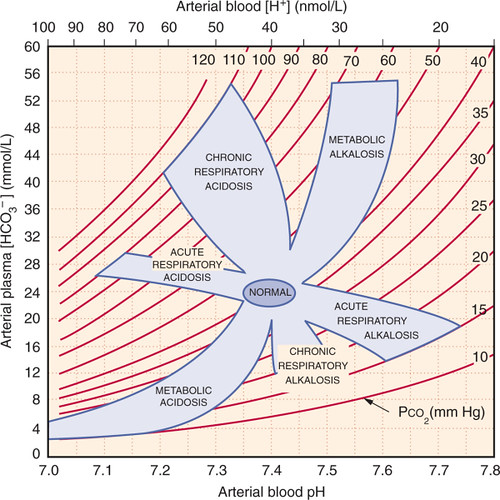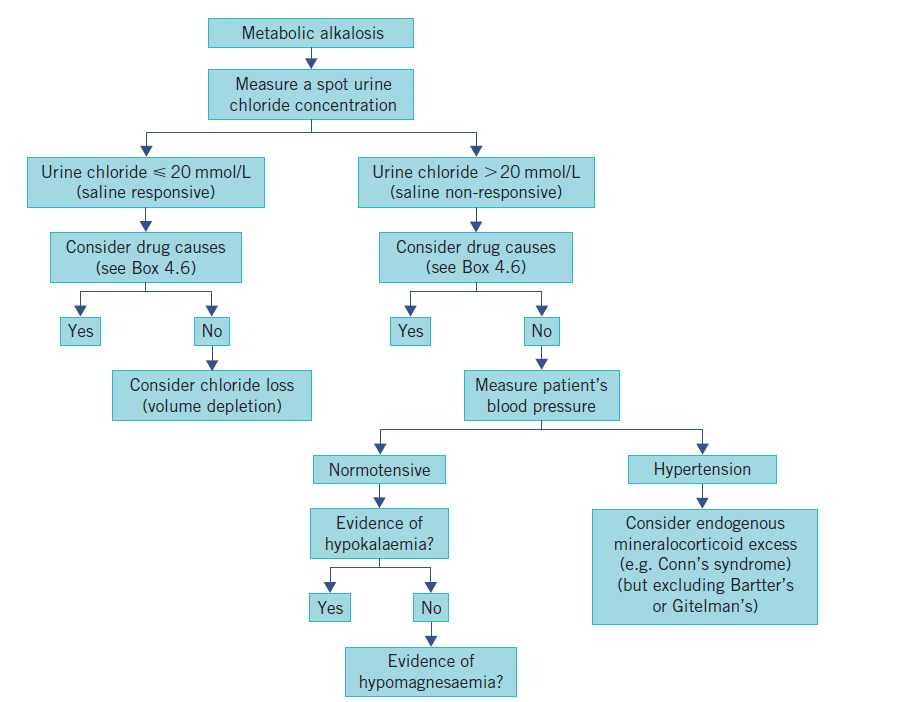Makindo Medical Notes"One small step for man, one large step for Makindo" |
|
|---|---|
| Download all this content in the Apps now Android App and Apple iPhone/Pad App | |
| MEDICAL DISCLAIMER: The contents are under continuing development and improvements and despite all efforts may contain errors of omission or fact. This is not to be used for the assessment, diagnosis, or management of patients. It should not be regarded as medical advice by healthcare workers or laypeople. It is for educational purposes only. Please adhere to your local protocols. Use the BNF for drug information. If you are unwell please seek urgent healthcare advice. If you do not accept this then please do not use the website. Makindo Ltd. |
Metabolic alkalosis
-
| About | Anaesthetics and Critical Care | Anatomy | Biochemistry | Cardiology | Clinical Cases | CompSci | Crib | Dermatology | Differentials | Drugs | ENT | Electrocardiogram | Embryology | Emergency Medicine | Endocrinology | Ethics | Foundation Doctors | Gastroenterology | General Information | General Practice | Genetics | Geriatric Medicine | Guidelines | Haematology | Hepatology | Immunology | Infectious Diseases | Infographic | Investigations | Lists | Microbiology | Miscellaneous | Nephrology | Neuroanatomy | Neurology | Nutrition | OSCE | Obstetrics Gynaecology | Oncology | Ophthalmology | Oral Medicine and Dentistry | Paediatrics | Palliative | Pathology | Pharmacology | Physiology | Procedures | Psychiatry | Radiology | Respiratory | Resuscitation | Rheumatology | Statistics and Research | Stroke | Surgery | Toxicology | Trauma and Orthopaedics | Twitter | Urology
Related Subjects: |Metabolic acidosis |Metabolic alkalosis |Arterial Blood gas analysis
🌡️ Analysis of Blood Gas (Metabolic Alkalosis)
- 📉 pH > 7.45 (alkalosis)
- ⬆️ HCO₃⁻ increased (primary cause)
- PaCO₂ usually normal (unless compensated with hypoventilation)
- PaO₂ usually normal
- ⚡ Often associated with hypokalaemia
🔎 Aetiology
- Caused by either acid loss (vomiting, NG suction) or alkali gain (bicarbonate, milk-alkali syndrome).


📋 Causes and Management
| 🩺 Cause | 🤒 Clinical Features | 🔬 Diagnostic Tests | 💊 Management |
|---|---|---|---|
| 🤮 Vomiting / NG Suction | Loss of HCl → dehydration, postural hypotension | ABG: ↑pH, ↑HCO₃⁻
U&E: ↓Cl⁻, ↓K⁺ |
IV 0.9% NaCl + K⁺ replacement
Stop suction / treat vomiting |
| 💊 Diuretics (Loop / Thiazide) | Weakness, dizziness, dehydration | ABG: ↑pH, ↑HCO₃⁻
Electrolytes: ↓K⁺, ↓Cl⁻ |
Stop / adjust diuretic
IV saline + KCl supplements |
| 🧬 Hyperaldosteronism | HTN, muscle weakness, thirst, polyuria | ABG: ↑pH, ↑HCO₃⁻
Electrolytes: ↓K⁺, ↑Na⁺ Renin: ↓, Aldosterone: ↑ |
Treat cause (e.g., adrenal adenoma)
Spironolactone / eplerenone |
| 💉 Excess Bicarbonate | Confusion, paraesthesia, cramps, fluid overload | ABG: ↑pH, ↑HCO₃⁻
Electrolytes: ↑Na⁺, ↓K⁺ |
Stop bicarbonate
Treat underlying acidosis cause |
| ⚡ Hypokalaemia | Weakness, palpitations, arrhythmias (PVCs) | ECG: U waves, flat T waves
Serum: ↓K⁺ |
Potassium replacement (oral / IV)
Treat underlying cause |
| 💧 Contraction Alkalosis | Dehydration (dry mouth, low BP) | ABG: ↑pH, ↑HCO₃⁻
U&E: ↓Cl⁻, ↓K⁺ Urine Cl⁻: low |
IV 0.9% NaCl + KCl
Correct volume loss |
| 🥛 Milk-Alkali Syndrome | Nausea, vomiting, confusion, kidney stones | ABG: ↑pH
Electrolytes: ↑Ca²⁺, ↑HCO₃⁻ Creatinine ↑ |
Stop Ca²⁺ / antacids
IV fluids Severe hypercalcaemia → bisphosphonates |
📝 Key Clinical Pearls
- 🔄 Compensation is usually by hypoventilation (↑PaCO₂).
- 🧪 Urine chloride helps: low (<15 mmol/L) suggests vomiting/diuretics, high (>20 mmol/L) suggests mineralocorticoid excess.
- ⚠️ Hypokalaemia and hypochloraemia are hallmarks and must be corrected.
🩺 Case 1 — Vomiting-Induced Alkalosis
A 45-year-old woman presents with 5 days of persistent vomiting from severe gastritis. She is weak, dizzy, and hypotensive. Labs: pH 7.50, HCO₃⁻ 36 mmol/L, K⁺ 2.8 mmol/L, Cl⁻ low. Management: 💧 IV 0.9% saline and potassium replacement to correct volume and electrolyte deficits. Treat underlying cause of vomiting. Avoid: ❌ Continuing NG suction or antiemetics alone without fluid/electrolyte correction.
🩺 Case 2 — Diuretic-Induced Alkalosis
A 72-year-old man with chronic heart failure on furosemide presents with weakness and muscle cramps. Vitals stable. Labs: pH 7.48, HCO₃⁻ 34 mmol/L, K⁺ 3.0 mmol/L. Management: 💊 Review diuretic dose, replace potassium and magnesium, consider adding potassium-sparing diuretic (spironolactone, amiloride). Avoid: ❌ Escalating loop diuretic dose without electrolyte monitoring.
🩺 Case 3 — Post-Hypercapnic Alkalosis
A 65-year-old man with COPD on home oxygen is admitted with acute hypercapnic respiratory failure. After aggressive ventilation in ICU, his PaCO₂ normalises but labs now show pH 7.52, HCO₃⁻ 36 mmol/L, K⁺ 3.4 mmol/L. Management: 🏥 Careful weaning of ventilation, electrolyte correction (K⁺, Cl⁻), acetazolamide may be considered to promote renal bicarbonate excretion. Avoid: ❌ Over-ventilation leading to sudden CO₂ drop; avoid bicarbonate administration.